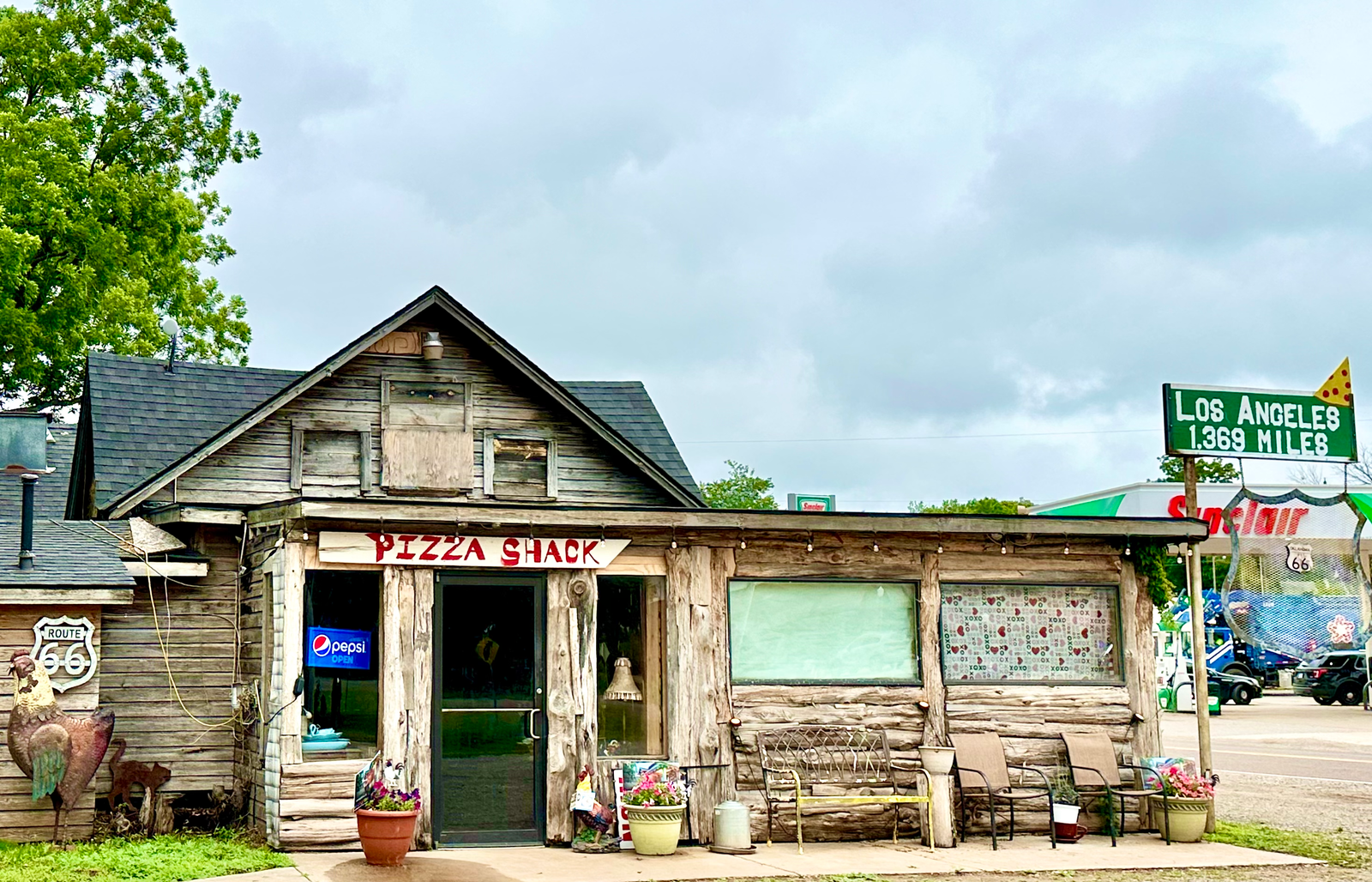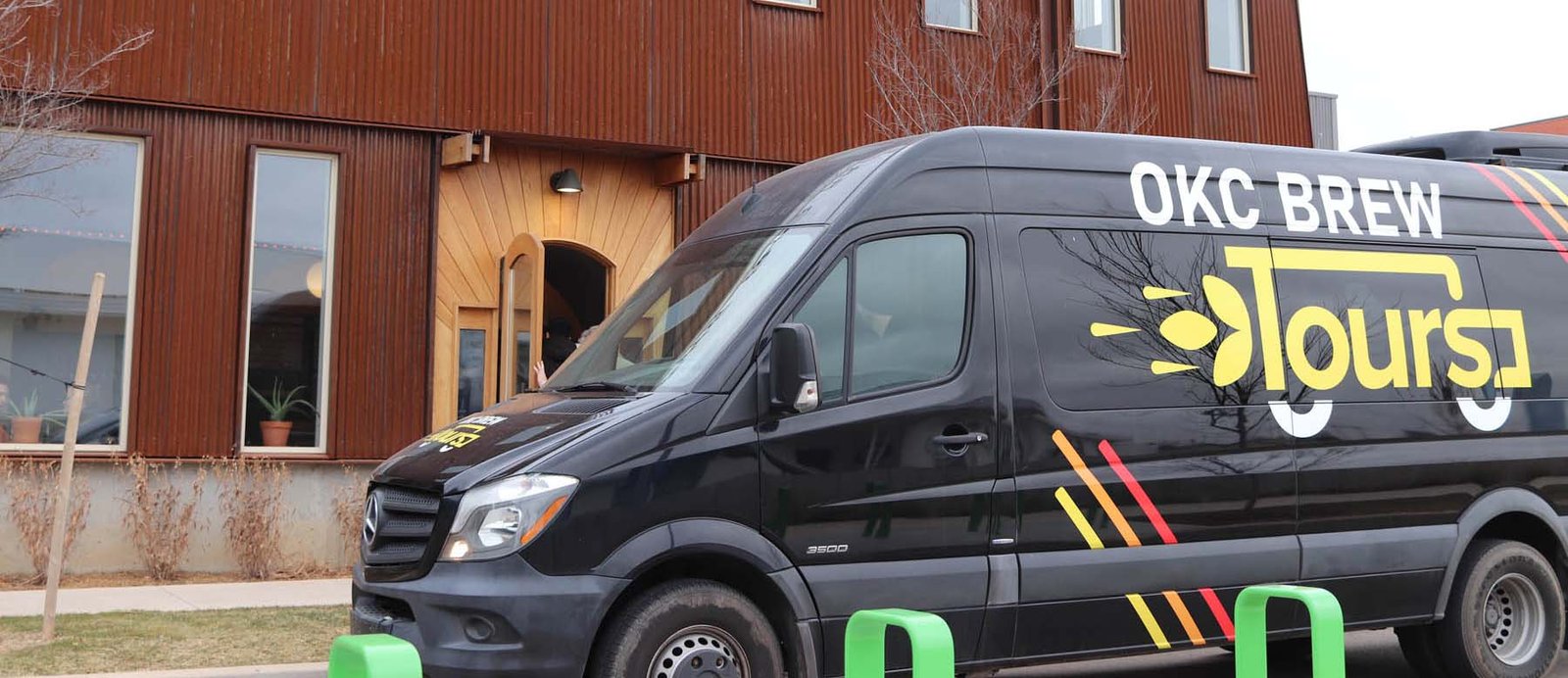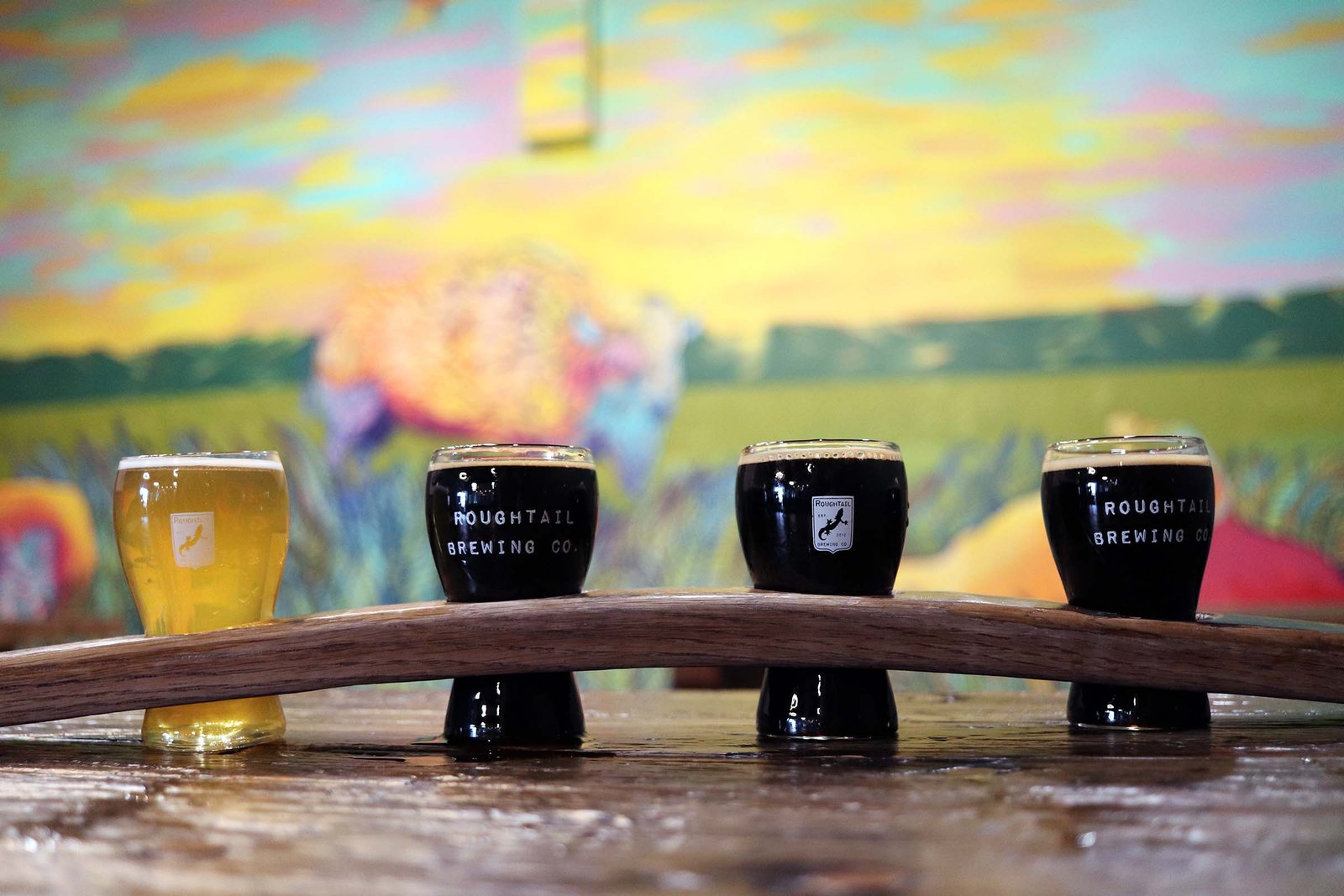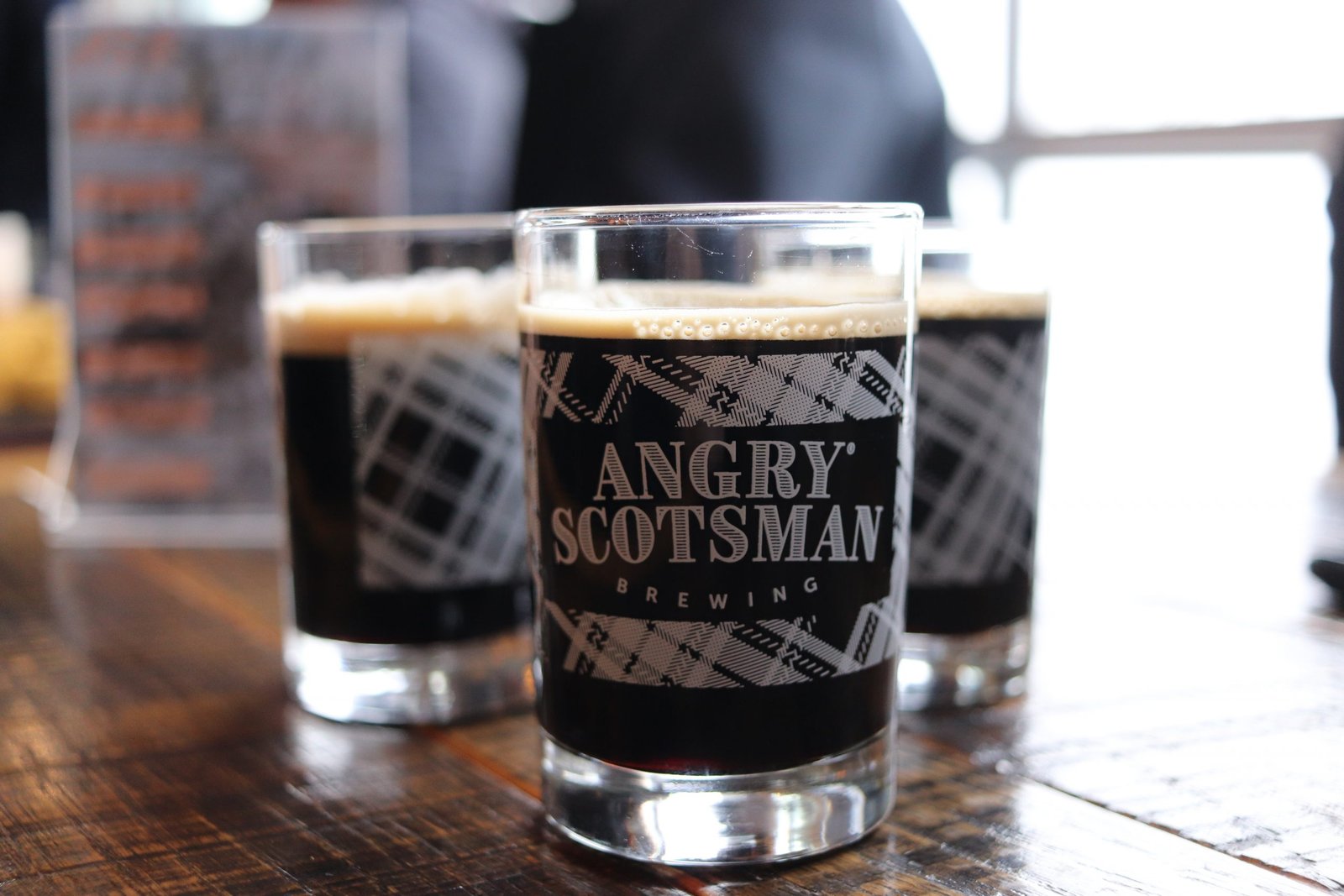Two Great American Traditions on Route 66: Pizza and Russian Baseball
Sitting at Pizza Shack in Arcadia, Oklahoma, I said to Bob Protexter, “I don’t write about food; I write about the people around the food, because their story is always more interesting.” At that moment, I didn’t know his story, but even if I had, that statement is obviously only partially true; some people aren’t very interesting, and I was in Arcadia to talk about food, and then write this.
Protexter refers to himself as Head Pizzaiolo and Chief Pizza Officer. Pizza Shack is the sister restaurant to Eddy Gochenour’s popular Chicken Shack next door, and pizza has been part of his life for nearly his entire life, not like it is for all of us who grew up eating pizza and likely have a favorite style or favorite pizzeria. A pizza joint in Sioux City, Iowa, and baseball are the twin threads you pull to get his story, because the shape of his life is woven by those threads.
Protexter took my statement as a personal challenge, and after acknowledging that he hates self-promotion, he said, “I moved to Moscow to coach baseball in 1990, and I spoke maybe ten words in Russian.” He didn’t say until later that he eventually worked as a scout and translator for the California Angels and Seattle Mariners of MLB, and twice for the Russian Olympic Committee at the Salt Lake and Vancouver games. Stories are living things, and if we allow them to, they take us places we could nothave predicted, but before we get to how a guy landed in Moscow with the clothes on his back, a few bucks, and ten words of Russian ended up working as a translator for the Olympics and MLB, we have to talk pizza.
 “I don’t want the pizza to get lost in the story,” Protexter said, as it became clear that what caught my attention – in addition to the cheesy bread – was the question of how a man with his baseball resume ended up in Arcadia, Oklahoma, slinging pizza.
“I don’t want the pizza to get lost in the story,” Protexter said, as it became clear that what caught my attention – in addition to the cheesy bread – was the question of how a man with his baseball resume ended up in Arcadia, Oklahoma, slinging pizza.
So as not to let the pizza get lost: You should go try it. It’s very good. Pizza Shack makes a tavern-style pie that Protexter jokingly refers to as an “Iowa stone pizza,” a reference to his origin story and the stone in the pizza oven. Tavern pies are all over the Midwest and Great Lakes regions, and they vary from very thin crust to thinner than hand-tossed, and typically the ingredients go all the way (or close) to the edge. It’s a red sauce pie, too. The Everything Pizza is a favorite of the regulars, and it will take you right back to the Pizza Inn days, when green olives were common toppings. The cheesy bread, which is really the signature crust with cheese and banana peppers, is inexplicably delicious. Given the proximity of Chicken Shack, they set it up where you can order from both restaurants in either restaurant.
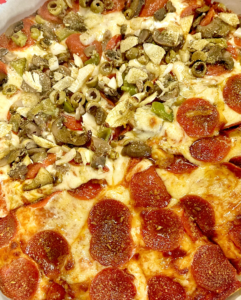 And now the part about how a dude from Iowa ends up in the Soviet Union, MLB, and the Olympics, and on Route 66 in Arcadia, Oklahoma.
And now the part about how a dude from Iowa ends up in the Soviet Union, MLB, and the Olympics, and on Route 66 in Arcadia, Oklahoma.
Growing up in Sioux City, Iowa, Protexter loved two things: baseball and Jerry’s Pizza. In fact, he loved more things, including football, but those are only tangentially related to the narrative, and football just once. “I was a skinny 2nd baseman,” he
said. “Eddy and I were on the same state high school football championship team, but he was a star linebacker and I was a skinny 2nd baseman on a football team.”
Three things: 1. Gochenour ended up playing linebacker at the University of Iowa, and then went into the restaurant business, moving to Oklahoma in 2011 to establish a “destination restaurant on Route 66.” 2. Protexter, skinny or not, played college baseball at the University of Texas Pan-American in Edinburg and Morningside College back home in Sioux City, where his father Don coached from 1955 until his death in 1983. Bob graduated in 1985. He would go on to coach at Morningside from 1997-2005. 3. Jerry’s Pizza emerged from Morningside Pizza, opened by Jerry and Ilene Foister in 1959. It’s a Sioux City institution, and it’s why we have tavern-style pizza of the sort made in Iowa in Arcadia, Oklahoma.
Jerry Foister hired Protexter in 1984, and over the next 34 years, Jerry’s Pizza was his fallback job whenever he needed additional income, even during his coaching career. “You won’t find Division 2 coaches living in mansions,” he said. His junior year in high school is notable because it was the same year he started at Jerry’s and won the state championship.
“We all drove theseChevy Chevettes that were falling apart,” he said. “One didn’t have a floorboard under the pedals, a couple had broken doors, and doors that didn’t lock. It was my first job, so I had to learn the ebb and flow of work. I got hired, fired, rehired all the time. It’s full circle to be in a role now where I give kids their first jobs.”
When the International Olympic Committee announced in 1986 that baseball would be a medal sport for the 1992 Olympics in Barcelona, the USSR initiated a process to eventually dominate baseball.
“They’d done the same thing with hockey and baseball,” Protexter said. “They didn’t just want to participate; they wanted a gold medal.”
Protexter wouldn’t know anything about Russian baseball until 1988, when he read a story about a baseball incubator in the Soviet Union. “I was working at Wells Enterprises in Le Mars, Iowa, at the time, putting small boxes of ice cream into bigger boxes for shipping,” he said. Wells is the maker of Blue Bunny ice cream, and it’s still the largest privately held, family owned ice cream manufacturer in the country. It wasn’t really a job that inspires you to make a career in the frozen treats industry.
 Soviet baseball started in 1987, and in 1988, the team played an exhibition series in the U.S. It was at a game against Johns Hopkins that Protexter met Rick Spooner, an American who worked in the Soviet Union as part of the U.S./U.S.S.R. Economic Trade Council. The two shared a love of baseball. He had a 15-minute conversion with Spooner, and showed him some letters of reference.
Soviet baseball started in 1987, and in 1988, the team played an exhibition series in the U.S. It was at a game against Johns Hopkins that Protexter met Rick Spooner, an American who worked in the Soviet Union as part of the U.S./U.S.S.R. Economic Trade Council. The two shared a love of baseball. He had a 15-minute conversion with Spooner, and showed him some letters of reference.
In 1990, he heard from Spooner again, this time with an offer. Protexter sold his car to buy a ticket to Moscow to become a coach for the Mendeleev Institute of Chemical Technology Red Devils. “The team initially wanted the Red Square Devils, but we collectively decided we didn’t want to risk offending the Kremlin, so we dropped ‘Square,’” he said.
All sports at that level – the High League – were club sports in the Soviet Union. Professional sports teams in practice, they actually looked more like hybrid amateur teams. Teams would be associated with organizations, and pay was negligible. Protexter made the equivalent of $38 a month. Because there was no history of baseball in the country, they called on athletes from other sports who were nearing the end of their careers or had already retired.
“Hockey goalies became catchers. Javelin throwers became pitchers, that sort of thing,” Protexter said. “I coached first base, and I helped set up practice routines for guys who’d never played baseball before.”
The head coach was retired handballer Andrei Borodin. That first team went 36-3, and won what was essentially the Soviet World Series, for which the players and coaches received a commemorative vase that still sits in a
prominent place in Protexter’s home. He never took that team to the 1992 Olympics. The Soviet Union dissolved in December 1991, and only eight teams went to Barcelona, where Cuba took the gold. For a year, 1992, he wasn’t in Russia.
“I was being paid $50 a month in the Soviet Union in 1991 to coach,” he said, “and I didn’t see that as viable for the long term, so in 1992 I sent away for information on government jobs in Washington. Had 13 manilla envelopes full of stuff, and then in March of 1992 the phone rang. The caller said: ‘This is Bob Fontaine, the Director of Scouting for the California Angels. I would like to talk with you a bit about Russian baseball. Do you have time now?'”
He was in U.S. for a year, helping get three Russian players signed, and then back to Russia, where he stayed until 1996, and then went back to work at Jerry’s while he figured out what was next. Next was coaching, but we covered that above, so the next big moment was in 2004, when Gochenour called him and asked him to coach Gochenour’s son Gray. That invitation led to multiple families hiring him to coach their kids one-on-one on the finer points of baseball. Protexter realized that he wasn’t done with baseball or pizza, and he started Total Baseball Development in 2005. The organization hosted clinics, camps, and leagues, including college prospect leagues.
“We’re best known for our fall leagues,” Protexter said. “We’ve had thousands of kids come through those leagues. I was busy on weekends because Jerry’s busiest days were weekends, so I got help coaching the teams.”
Total Baseball Development had its highest number of teams in 2022, with 54, and yes, they’re still hosting leagues, camps and clinics. Jerry’s and TBD kept him busy. In 2019, Russia called. They were trying to qualify for the 2020 Olympics. He helped coach them up, but they were eliminated by Israel, and it was back to Sioux City.
Gochenour called him in 2023 to say he’d like Jerry’s Pizza, or something like it, in Oklahoma. Protexter dropped everything and headed south. He helped Gray – the son he’d coached in ‘04 – open the Pizza Shack, and now Protexter oversees day-to-day operations.
“Eddy told me we nailed it, and I appreciate that,” he said. “I don’t seek out accolades in my own life, but that really felt good. You can’t really replicate greatness like Jerry’s, but I’m proud of what we’ve done here. I worked at Jerry’s on and off for 34 years, and I never got tired of their pizza. I hope people feel the same way about this place.”
As for baseball, Protexter is working the grounds crew for the Oklahoma City Dodgers. It’s a way of staying connected to baseball, and he said he’s fascinated by the experience of working at a Triple-A stadium. “You have these 30 MLB stadiums, and they’re like palaces,” Protexter said, “but right below them is Triple-A. I’m enjoying it.”

